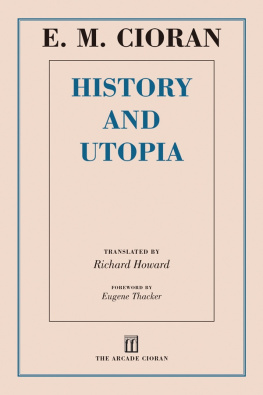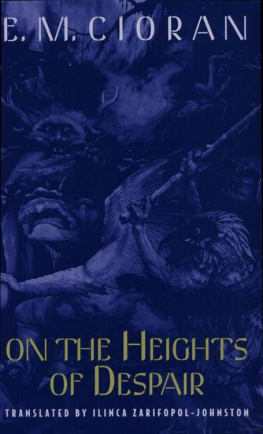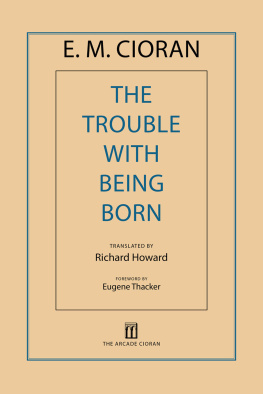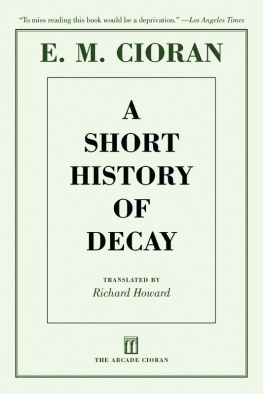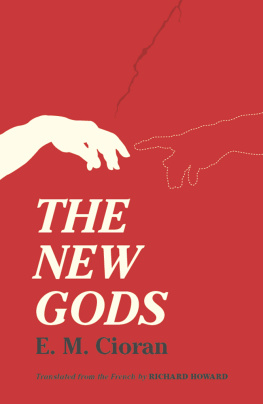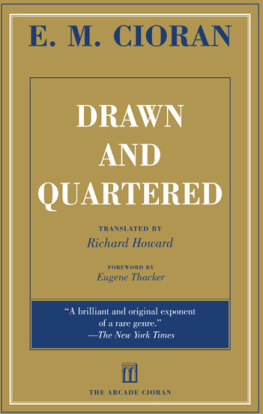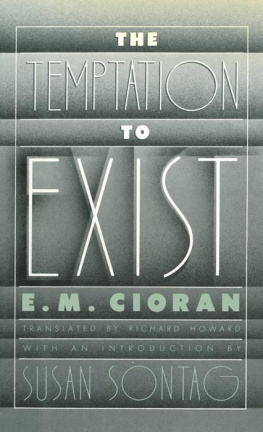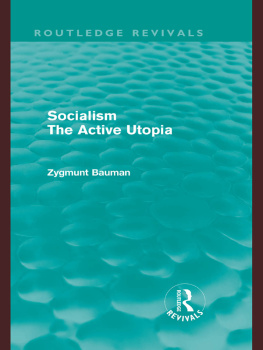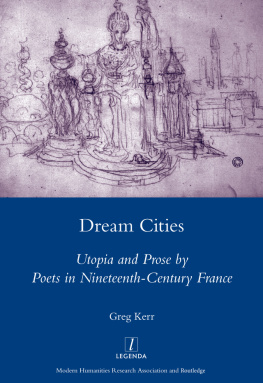By the same author,
Drawn & Quartered The Trouble with Being Born The Temptation to Exist

Copyright 1960 by Editions Gallimard
English-language translation copyright 1987 by Richard Howard
Foreword copyright 2015 by Skyhorse Publishing, Inc.
All rights reserved. No part of this book may be reproduced in any manner without the express written consent of the publisher, except in the case of brief excerpts in critical reviews or articles. All inquiries should be addressed to Arcade Publishing, 307 West 36th Street, 11th Floor, New York, NY 10018.
Arcade Publishing books may be purchased in bulk at special discounts for sales promotion, corporate gifts, fund-raising, or educational purposes. Special editions can also be created to specifications. For details, contact the Special Sales Department, Arcade Publishing, 307 West 36th Street, 11th Floor, New York, NY 10018 or arcade@skyhorsepublishing.com.
Arcade Publishing is a registered trademark of Skyhorse Publishing, Inc., a Delaware corporation.
The essays in this volume have appeared previously in the following publications:
Letter to a Faraway Friend in TriQuarterly , no. 11 (Winter 1968)
Russia and the Virus of Liberty in The Mississippi Review 4344 (Fall 1986)
Learning from the Tyrants in Southern Humanities Review 20, no. 4 (Fall 1986)
Odyssey of Rancor in Grand Street (Spring 1986)
Mechanism of Utopia in Grand Street (Spring 1987)
The Golden Age in Antaeus 2122 (Summer 1976)
Visit our website at www.arcadepub.com.
10 9 8 7 6 5 4 3 2 1
Library of Congress Cataloging-in-Publication Data is available on file.
Print ISBN: 978-1-62872-425-7
Ebook ISBN: 978-1-62872-466-0
Printed in the United States of America
Contents

FOREWORD
by Eugene Thacker

The desire for utopia is, arguably, as urgent and as necessary as the desire for history. They are the meaning-making activities through which we as human beings project ourselves back into the past and forward into the future. And yet, both are fabrications, products of human intellectual labor, forged and re-forged with all the solidity and assurance of fact. That is, until the drama is played out once again.
This is readily apparent for the person living in exileespecially that of a self-imposed exile. Removed from one context and transplanted into another, human affairs become uncanny, a familiar pantomime with different sets and different costumes. Such was the outlook of E. M. Cioran, the Romanian-born author who, in 1946, relocated to Paris, vowing never to return to Romania. Writing in a language not his own, cut off from friends and family, and immersed in a cosmopolitan culture he kept at arms length, the young Cioran began to develop a style of writing that wasand still isdifficult to place, somewhere between philosophy and poetry, the confession and the rant, ecstatic nihilism and black humor.
Strange, then, that an author like Cioran would publish a book with the title History and Utopia . By its title alone, History and Utopia published in 1960announces itself as a book about politics, a book of its moment. But readers will be disappointed if they expect to find a plan for political action, a manifesto for a coming revolution, or even a commentary on current events. The books sentiments are encapsulated one of the essays, entitled Odyssey of Rancor: The multiplication of our kind borders on the obscene; the duty to love them, on the preposterous.
Composed of essays written during the late 1950s, History and Utopia contains a fascinating range of registers, from the confessional opening chapter to the almost cosmic final chapter. Coursing through it all is Ciorans own brand of political pessimism, an indictment of utopia that itself becomes a strange kind of misanthropic utopia, a utopia without hope, in which politics always fails because it regards itself as an exclusively human-centric endeavor: Viscerally inclined to systems, we ceaselessly construct them, especially in politics, domain of pseudoproblems, breeding ground of the bad philosopher who resides in each of us, a realm I would be exiled from for the most commonplace of reasons, a piece of evidence which is raised in my eyes to the rank of a revelation: politics revolves uniquely around man .
Coming from Cioran, such a zooming-out of what we normally consider politics should not surprise us. From his early Romanian book On the Heights of Despair (1934), to his first book written in French, A Short History of Decay (1949), to his critical dismantling of existentialism The Temptation to Exist (1956), Cioran had, by the 1950s, become known as a thinker who refused to be allied with any doctrine, be it religious, philosophical, or political. Notorious for its stark, nihilistic indictments against humanity, Ciorans writing is a sustained practice of refusal. At the same time, History and Utopia is unique among Ciorans books in that it does deal directly with the political issues of his time, most presciently, the turbulence in Eastern Europeparticularly in Romaniaand the broader historical ramifications of an ongoing Cold War for a rapidly modernizing West.
We should note, however, that in spite of its explicit references to political events, History and Utopia is not the sole political writing of Cioran. In 1936 a young, impassioned, and politicized Cioran published a book in Romanian entitled The Transfiguration of Romania . Part of Romanias young generation of intellectuals, Cioran was taken by the political extremism then sweeping through Bucharest. A confused and delirious piece of writing, The Transfiguration of Romania was Ciorans attempt to embrace a militant mysticism of the old world and the new, a heady mix of nationalistic zeal and apocalyptic renewal. Filled with romantic formulas for criminal lucidity and messianic fury, the authors enthusiasm quickly led to disenchantment, accompanied by an all-encompassing resentment for all political systems, moderate or extreme, left or right. By the end of the war, Cioran had disavowed the book and ceased writing about current events altogether.
But it continued to haunt him for the rest of his life. In interviews, when asked about The Transfiguration of Romania , Cioran is by turns remorseful, disdainful, bitter. The estrangement from his own writing would prompt him to write the series of essays that would become History and Utopia . There were external reasons as well. The 1956 insurrection in Budapest, which Cioran witnessed from afar, was intensified in his correspondence with his friend and former schoolmate, the philosopher Constantin Noica, held for years as a political prisoner by the Soviet-backed regime. Their correspondence would be the basis for the opening chapter of History and Utopia , Letter to a Faraway Friend.
The letter is indicative of the many conflicted voices that constitute History and Utopia . Continuing his practice of writing against oneself, Ciorans prose slips between the personal and the political, unwilling to engage with the world but incapable of detaching himself from it: I seem to myself, among civilized men, a kind of intruder, a troglodyte enamored of decrepitude, plunged into subversive prayers, victim of a panic that emanates not from a vision of the world but from the spasms of the flesh and the tenebrae of the blood. An Augustine without his faith, a Kierkegaard without his leap.
Cioran proposes nothingand, perhaps, therein lies his politics. Neither heroic nor tragic, nor even comedic History and Utopia is the testimony of someone who has given up on politics because, in part, he has given up on the humanor at least the image of humanity that incessantly feeds the political machinations of both history and utopia. How could it be otherwise on a planet where flesh propagates with the shamelessness of a scourge? Wherever we go, we come up against the human, a repulsive ubiquity before which we fall into stupor and revolt... All that remains is this void of refusal, though it is, in Ciorans own words, a void that affords plentitude, a fulfilling void.
Next page
